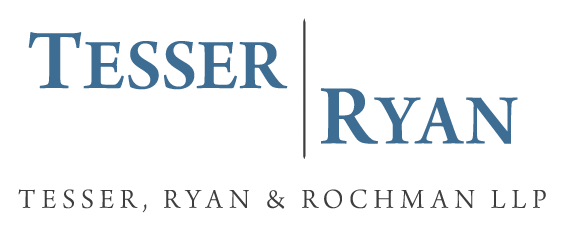5 Things to Look for When Selling or Purchasing a Business
No matter what type of business you are purchasing or selling, it is critical that the contract of sale be properly drafted. Although each contract should be tailored to the particular transaction, there are numerous provisions that are common to nearly all contracts of sale. If you are selling or purchasing a business and would like the advice of experienced business counsel, please call Tesser, Ryan & Rochman, LLP at (212) 754-9000. As a brief overview, I will discuss five of the most salient issues and contract provisions.
1. Asset Sale or Stock Sale
The first question the parties must decide is whether to structure the transaction as an asset sale or stock sale. Typically, in an asset sale, the purchaser acquires all or substantially all of the assets of seller—viz. the seller’s trade fixtures, equipment, facilities, inventory, intellectual property, etc. In stock sale, by contrast, the purchaser acquires the stock (or, in the case of a limited liability company, the “membership interest”) of the seller.
It is often advantageous for the buyer to structure the transaction as an asset sale. In an asset sale, the buyer generally does not assume the liabilities of the seller. With limited exceptions, the buyer is free to determine which liabilities to assume, if any. In a stock sale, on the other hand, the buyer assumes all of the seller’s existing liabilities, actual and potential.
2. Lease
In a business sale, one of the most important assets being conveyed to the buyer is the seller’s premises lease; it is essential that the buyer be able to continue the business at its present location. Therefore, in an asset deal, it is imperative that the seller assign its lease to the buyer.
Almost every lease includes an assignment provision, prohibiting an assignment of the lease without the landlord’s prior consent. Accordingly, the contract of sale must provide that the transaction is contingent upon the landlord’s consent to the assignment.
Many leases treat stock sales as assignments, and prohibit the tenant from selling all or a designated portion of its stock (or membership interest) without the landlord’s prior consent. Again, in such cases, the landlord’s consent should be a condition to closing.
Landlords typically will not consent to an assignment unless certain conditions are met. Often, these conditions are spelled out in the assignment provision. Common conditions include payment of an assignment fee, payment of an additional security deposit, provision of satisfactory proof of the purchaser’s financial condition, and obtaining a personal guaranty—be it an unlimited guaranty or a good guy guarantee—from the buyer’s owners.
If the seller’s owners have guaranteed the lease, it is important that they be released from the guaranty upon the sale of the business. The contract of sale should include a provision making the closing contingent upon the landlord’s release of the seller from the guaranty.
3. Sales Tax
As previously stated, typically, in an asset deal, the purchaser does not assume the liabilities of the seller. However, there is an important exception to this rule for unpaid sales and use taxes. A purchaser is liable for any of the seller’s unpaid sales or use taxes up to the amount paid by purchaser to seller (or the fair market value of the assets, whichever is greater). The seller’s owners are also personally liable for the seller’s unpaid sales and use taxes.
Purchasers are advised to take precautions to ensure that they will not be responsible for the seller’s unpaid taxes. One nearly universal precaution is for the parties to hold a fraction of the purchase price in an escrow until the tax department issues a release, releasing the purchaser from liability for the seller’s unpaid taxes. Upon receipt of the release, the escrowee should release the remainder of the purchase price to the seller.
If the purchase involves a promissory note, as an additional precaution, the contract of sale may provide that the promissory note be held in escrow until a release is issued. Under this arrangement, the purchaser would make payments under the promissory note directly to the escrowee. If the tax department determines that sales tax is due, the escrowee would use such payments to satisfy the tax liability.
4. Restrictive Covenants
Naturally, the purchaser of a business does not want the seller to open a competing business next door. It is therefore essential for the contract of sale to include restrictive covenants.
The purchaser should require the seller enter into non-competition and non-solicitation covenants. A non-competition covenant prevents the seller from operating a competing business within a geographic area for a set amount of time after the business is sold. A non-solicitation covenant prevents the seller from initiating contact with former employees, clients and customers for a set amount of time after the business is sold. To be enforceable, the covenants must be reasonable in duration, geographic scope and in the definition of the restricted activity.
If a seller breaches the restrictive covenant, the purchaser may be entitled to injunctive relief—that is, a court order prohibiting the seller from engaging in particular actions in violation of the covenant.
5. Representations
A representation is a statement of fact made by one contracting party to another regarding a fact or circumstance relevant to the contract. The party to whom a representation is made may rely on the truth of the representation. A contract of sale typically includes a warranty that the representations are true and accurate as of closing (or makes the truth and accuracy of the representations as of closing a condition to closing). Some important representations are set forth below.
Purchaser’s Representations.
(a) Purchaser has sufficient funds to complete the purchase.
(b) Purchaser has corporate authority to purchase the business.
(c) Purchaser has inspected the premises and all of the assets being purchased and is accepting them “as is.”
Seller’s Representations.
(a) Seller has good and marketable title to the assets being sold. The assets are free and clear of all liens, restrictions and encumbrances.
(b) If a stock stale, the seller should represent that the shares were duly authorized, validly issued and outstanding, and that they are free of all liens, restrictions and encumbrances.
(c) The executory contracts being conveyed to purchaser (including the premises lease) are in full force and effect and seller has not received a notice of default.
(d) Seller is not the subject of any pending or threatened audit by any governmental agency.
(e) Seller is in compliance with all applicable environmental laws and there are no violations or alleged violations against it.
(f) There are no judgments outstanding or civil or criminal actions pending against the seller.
It is often a good idea for the purchaser to require both the seller and its individual owners to make the representations. After closing, it is probable that the selling entity will have no or insufficient assets with which to satisfy any claim of fraud or breach of contract. If the owner is a party to the representation, the purchaser may seek satisfaction from him personally.
If you are selling or purchasing a business and would like the advice of experienced business counsel, please call Tesser, Ryan & Rochman, LLP at (212) 754-9000.

